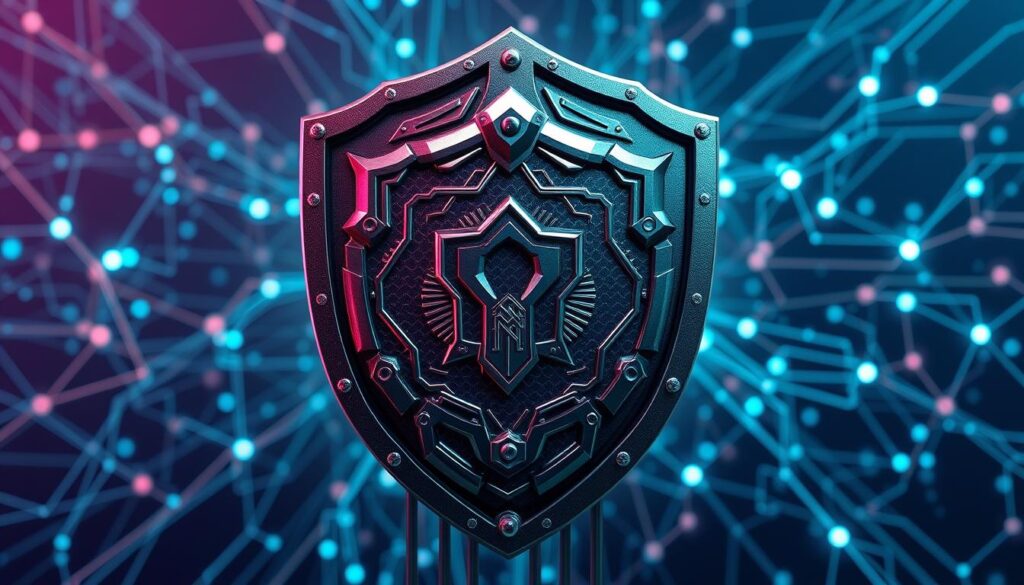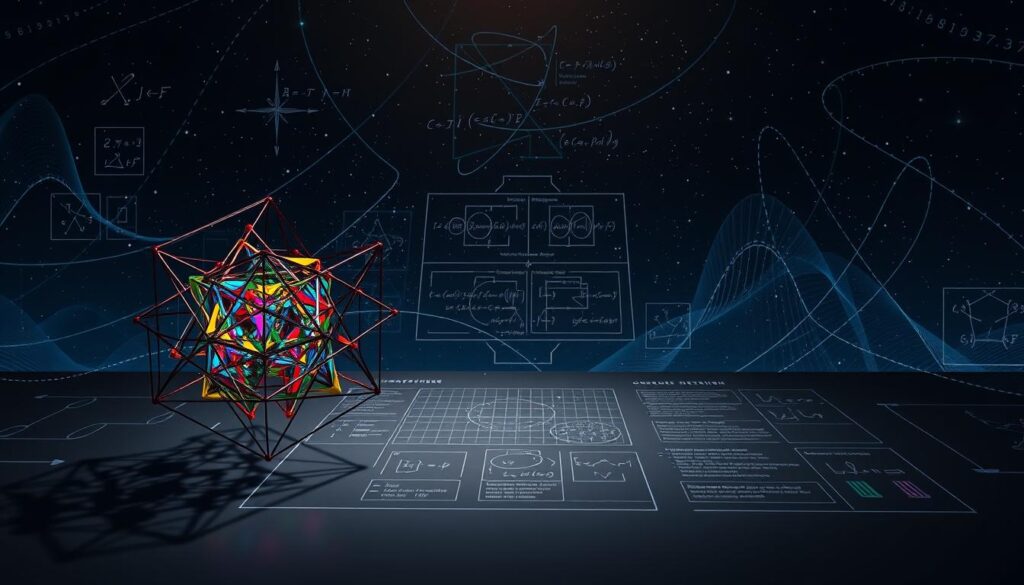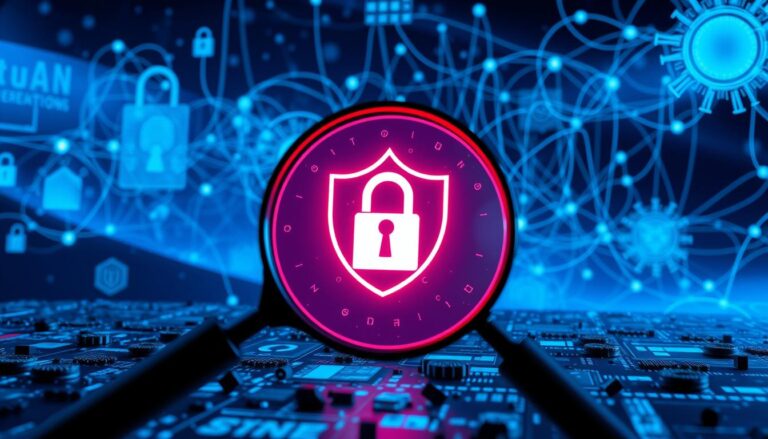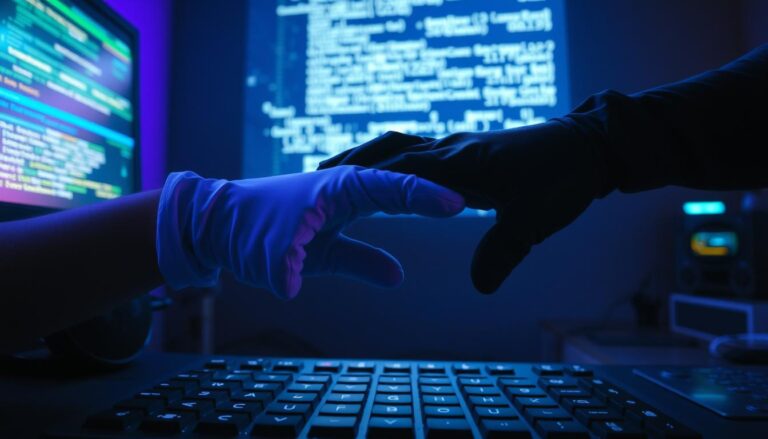Have you heard about the cyber battle coming our way? It’s not just a rumor; it’s a serious threat to our information security. Experts call this threat Q-Day.
Q-Day is when a quantum computer can break the most common encryption. Picture a lab in Santa Barbara, Seattle, or a secret place in China. Scientists are close to revealing all our secrets, including yours.
This isn’t just a story; it’s a real danger that could change how we protect our data. As we face this challenge, knowing about Q-Day is key to keeping your online identity safe.
The Quantum Computing Revolution
We are on the edge of a new era with quantum computing. It’s key to grasp its basics and how it affects cybersecurity.
Quantum computing uses quantum mechanics to process information. Unlike regular computers, it uses qubits that can be in many states at once. This lets quantum computers handle huge amounts of data much faster.
What is Quantum Computing?
Quantum computing taps into quantum mechanics for calculations. Qubits can be both 0 and 1 at once. This, along with other quantum effects, makes quantum computers super fast for some tasks.
Recent Breakthroughs in Quantum Technology
Recently, quantum tech has made big strides. Improvements in qubit stability and quantum error correction have been key. Companies like IBM, Google, and Rigetti Computing are leading the way.
These advances are exciting for solving complex problems. They also highlight the need for better cyber attacks and data security.
The impact of these breakthroughs is huge. They could change fields like drug discovery and cybersecurity. As quantum computing grows, understanding its benefits and challenges is vital.
Traditional Encryption: Our Current Digital Shield
In the digital world, traditional encryption is our main defense against cyber threats. For years, encryption algorithms like RSA have kept our data safe. They make it hard for others to get into our information.

How Modern Encryption Protects Your Data
Modern encryption turns your data into a code that only the right key can unlock. This way, even if someone tries to get your data, they won’t be able to read it. Encryption is key to keeping our digital lives safe, from messages to money transfers.
Encryption comes in two types: symmetric and asymmetric. Symmetric uses the same key for both, while asymmetric uses a pair. Asymmetric encryption, like RSA, is great for safe internet data sharing.
The Mathematics Behind Encryption
Encryption algorithms like RSA are based on hard math problems. RSA uses the challenge of breaking down big numbers into their prime factors. The bigger the number, the more secure your data. This math is why RSA and similar algorithms are so good at keeping our data safe.
“The security of RSA is based on the difficulty of factoring large integers. This is a classic problem in number theory, and it is believed to be computationally infeasible with current algorithms and technology.”
Limitations of Current Encryption Methods
Even with their strengths, current encryption has its weaknesses. One big issue is how vulnerable they are to faster computers, like quantum ones. Quantum computers can solve some math problems way faster than old computers, which could break encryption like RSA.
Another problem is managing encryption keys. With more users and devices, keeping track of keys gets harder. Keeping keys safe and secure is crucial for encrypted data.
We need to keep learning about these weaknesses. We must find new ways to protect our data from quantum computers and other new threats.
The Looming Cyber Battle Between Quantum Computing and Encryption
Quantum computing is changing how we protect our digital world. It’s challenging our encryption methods. Knowing the threats quantum computing poses to our encryption is key.
Shor’s Algorithm: The Quantum Threat to RSA
In 1994, Peter Shor created Shor’s algorithm. It can factor large numbers much faster than any old computer. This is a big problem for RSA encryption, a mainstay of our digital security.
RSA’s strength comes from making big numbers into smaller prime factors. But Shor’s algorithm, on a strong quantum computer, could break RSA. This would make our digital security weak.
This is a big deal. A big quantum computer could break RSA encryption. This would mess up secure web browsing and encrypted messages.
Grover’s Algorithm and Symmetric Encryption
Grover’s algorithm is different. It’s about symmetric encryption. It can find something in a database faster than before. This means we need longer keys to keep data safe.
For example, AES-128 might not be enough soon. We might need to switch to AES-256. This is because Grover’s algorithm can cut the security of a key in half.
Timeline of Vulnerability: When Will Your Data Be at Risk?
We don’t know exactly when quantum computers will break our encryption. But experts say it could happen in the next 10 to 20 years. They think we might see quantum computers strong enough to break RSA-2048 in 5 to 10 years.
To get ready, keep up with quantum computing news. Start thinking about new encryption methods. Here are some steps:
- Keep up with quantum computing and new encryption.
- Check if your encryption is safe against quantum computers.
- Look into new encryption methods and how to use them.
As we move forward, making your digital security stronger is key. This means using new encryption and keeping your security up to date.
By understanding the battle between quantum computing and encryption, you can protect your digital stuff. This helps keep your cyber resilience strong against new hacking threats.
Quantum-Resistant Cryptography: The Next Line of Defense
The rise of quantum computing has led to a push for new, strong cryptography. This is to protect our internet security from quantum threats.
Experts and groups like the National Institute of Standards and Technology (NIST) are working hard. They aim to create algorithms that can fight off quantum attacks. This will keep our online defense safe.
Post-Quantum Cryptographic Algorithms
New algorithms are being made to replace old ones that quantum computers can break. Dr. Dustin Moody from NIST says, “We want algorithms that are not just quantum-resistant but also easy to use.”
“Moving to quantum-resistant cryptography is a big challenge. It’s not just about the tech, but also getting everyone to use it.”
NIST’s Standardization Process
NIST is key in making these new algorithms standard. They check and pick algorithms that can stand up to both old and new computers. NIST is now looking at the algorithms people have sent in.

Implementation Challenges for Organizations
Companies face big hurdles in using these new algorithms. They must deal with the tech and making sure it works with what they already have. Cybersecurity experts say, “It’s important to start planning early and understand the risks.”
To get ready for the quantum future, companies should check their current security. They should also plan how to switch to new, quantum-safe algorithms.
Quantum Key Distribution: Fighting Quantum with Quantum
In the cyber battle ahead, quantum key distribution could be a game-changer. It uses quantum mechanics to create and share keys, offering better security against some attacks.
Principles of Quantum Encryption
QKD relies on quantum mechanics. Measuring a quantum system changes it, which helps detect eavesdropping. Quantum entanglement and quantum superposition are key to its security.
It encodes keys on quantum particles like photons and sends them between parties. Any interception causes errors, making it detectable. This keeps the key exchange secure, as any eavesdropping is noticed.
Current QKD Networks and Implementations
Many groups and countries are setting up QKD networks. For example, China’s Quantum Experiments at Space Scale (QUESS) satellite shows satellite-based QKD works. Also, Europe’s Quantum Internet Alliance aims to build a quantum internet with QKD.
- Organizations are exploring QKD for secure communication.
- Governments are investing in QKD infrastructure.
- Research is ongoing to improve QKD technology.
Limitations and Practical Challenges
QKD has its hurdles. It’s only effective over short distances because quantum signals weaken in fibers. Also, the tech needed is complex and pricey.
- Distance limitations due to signal attenuation.
- High cost of specialized equipment.
- Need for dedicated infrastructure.
As the battle between quantum computing and encryption goes on, QKD is a hopeful solution. It has its limits, but research aims to beat these, possibly changing cybersecurity forever.
The Global Race for Quantum Supremacy
Quantum supremacy is more than a tech win; it’s a strategic gain for nations like the US and China. As we move towards a quantum future, the battle to lead in this tech is heating up. This has big effects on cyber warfare and digital security.
The US, China, and the European Union are leading this global battle. They’re spending a lot on quantum research and development. This fight is not just about being tech-savvy; it’s about getting ahead in a fast-changing world.

United States Quantum Initiatives
The US is pushing hard for quantum supremacy through many efforts. The National Quantum Initiative Act, passed in 2018, is a big help. It funds and coordinates quantum research across government, academia, and industry.
- Setting up quantum research centers
- More money for quantum projects
- Working together between government and private companies
China’s Quantum Ambitions
China is also making big moves in quantum tech. They have a plan that covers quantum computing and communication. China is putting a lot of money into quantum research, aiming to build a quantum-enabled network.
- Launching the Quantum Experiments at Space Scale (QUESS) satellite
- Building quantum communication networks
- Improving quantum computing hardware
Other International Players
While the US and China lead, other countries are also in the quantum race. The European Union, for example, has started the Quantum Flagship program. It’s a big research effort to develop quantum tech.
| Country/Region | Key Quantum Initiatives |
|---|---|
| United States | National Quantum Initiative Act, Quantum Research Centers |
| China | QUESS Satellite, Quantum Communication Networks |
| European Union | Quantum Flagship Program |
The global quantum supremacy race is changing the game for cyber warfare and digital security. The first to win quantum supremacy will have a big advantage. But this race is also pushing tech forward, shaping our future.
Preparing Your Digital Life for the Quantum Era
The quantum era is coming, and it’s time to protect your digital info. Quantum computing is a big threat to our current encryption. This could let hackers get to your private data.
Steps You Can Take Today
Even though quantum computers are still new, you can start getting ready now. Upgrading your encryption and using quantum-resistant cryptography are key first steps.
- Keep up with quantum computing and quantum-resistant cryptography news.
- Check if your encryption is safe and find weak spots.
- Start using quantum-resistant algorithms when you can.
What to Expect from Service Providers
As the quantum era gets closer, service providers will be key in protecting our digital stuff. They will use quantum-resistant cryptography and improve their security.
Look out for these important changes:
- They will use new, quantum-safe algorithms.
- They will keep updating their security to fight new threats.
- They will be open about their quantum readiness and future security plans.
Long-term Digital Security Planning
Getting ready for the quantum era means thinking long-term about digital security. It’s not just about quick fixes but also about planning for the future.
Here are some long-term strategies:
- Invest in training for your IT and security teams.
- Keep updating your security to stay ahead of threats.
- Work with experts and keep up with quantum computing and security news.
Economic and National Security Implications
Quantum computing is changing the game for both the economy and national security. This new tech will impact many areas, like critical infrastructure, finance, and military communications.
Critical Infrastructure Vulnerabilities
Critical systems like power grids and healthcare depend on secure networks. Quantum computing could crack current encryption, leaving them vulnerable to cyber attacks.
A report by the National Infrastructure Advisory Council stresses the need to protect these systems from quantum threats.
| Critical Infrastructure | Potential Quantum Threat | Mitigation Strategy |
|---|---|---|
| Power Grids | Disruption through compromised encryption | Implement quantum-resistant cryptography |
| Transportation Systems | Unauthorized access to control systems | Enhance network security with quantum key distribution |
| Healthcare Services | Data breaches compromising patient information | Upgrade to quantum-secure communication protocols |
Financial System Risks
The financial world is also at risk from quantum computing. It could break encryption algorithms, letting hackers into sensitive financial data. This could shake the global financial system.
Deloitte suggests that financial institutions need to get ready for quantum threats. They should use quantum-resistant cryptography.

Military and Intelligence Applications
Military and intelligence communications are also at risk. Quantum computing’s power could break encrypted messages, giving enemies an edge.
Countries are investing in quantum tech to stay ahead in military and intelligence fields.
In summary, quantum computing’s effects on the economy and national security are huge. It’s key for both organizations and governments to boost their cyber resilience and information security efforts.
Ethical Considerations in the Quantum Age
Quantum computing is more than just a tech advance. It also brings up big ethical questions. We need to tackle these to make sure our digital world is safe and fair for everyone.
Two big issues stand out as we move forward: privacy and the digital divide.
Privacy Concerns in a Post-Encryption World
Current encryption is vulnerable to quantum attacks, threatening our privacy. As quantum computers get stronger, our personal data becomes more at risk. This could mean our privacy is no longer protected.
Protecting online defense is key to solving this problem. We need to create and use new, quantum-proof encryption methods to keep our data safe.
The Digital Divide: Who Will Have Quantum Protection?
Quantum computing also worries about a digital divide. As big players invest in quantum tech, some might not get to enjoy its benefits. This could make existing inequalities worse, like in internet security.
| Stakeholder | Current Status | Future Needs |
|---|---|---|
| Individuals | Limited awareness of quantum risks | Education on quantum security |
| Organizations | Investing in quantum technology | Implementation of quantum-resistant cryptography |
| Governments | Developing quantum policies | Regulations for quantum security standards |
Fixing these ethical issues needs everyone’s help. By understanding quantum computing’s effects and acting early, we can ensure its benefits reach everyone. This way, we can reduce its risks.
Conclusion
As we approach a quantum revolution, the fight between quantum computing and encryption is getting fiercer. Our choices today will decide if we use this tech for good or let it harm our cybersecurity.
You are key in this cyber battle. Knowing how quantum computing affects security is vital. This tech brings both dangers and chances that will change our digital world.
To win this cyber battle, keep up with quantum computing and its security impact. This way, you can protect your online life and help make the digital future safer.
FAQ
What is Q-Day and how will it affect current encryption methods?
Q-Day is when a powerful quantum computer is ready. It could break today’s encryption, making online security weak. This change could be big for keeping our data safe.
How does quantum computing differ from classical computing?
Quantum computers use quantum stuff to do math, unlike classical computers. This makes quantum computers way faster for some problems. But, it also means they could be a big threat to our online safety.
What is Shor’s algorithm, and how does it threaten current encryption?
Shor’s algorithm is a quantum trick that can solve big math problems fast. It could break RSA encryption, which is used to keep online data safe. This shows we need new, quantum-safe ways to encrypt our data.
What is Quantum Key Distribution (QKD), and how can it enhance security?
QKD uses quantum to send secret messages. It’s super secure, but it has limits. For example, it’s hard to send these messages far without losing security.
How can individuals and organizations prepare for the quantum era?
To get ready, learn about quantum threats and benefits. Use quantum-safe encryption and plan for the future. Keep up with new security tech to stay ahead.
What are the implications of quantum computing for economic and national security?
Quantum computers could risk our financial systems and critical infrastructure. They could also change how we do military and spy work. It’s a big deal for both our economy and national safety.
How will quantum computing affect privacy, and what are the potential societal implications?
Quantum computers might break some encryption, hurting privacy. This could create a gap between those with and without quantum-safe tech. It’s a big issue for our digital rights.
What is the current state of the global race for quantum supremacy?
The race for quantum supremacy is heating up, with the US and China leading the way. They’re spending a lot on quantum research. This is pushing tech forward, but it also worries us about the risks.




